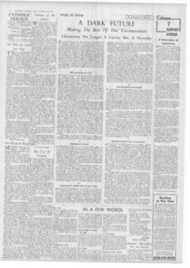Page 4, 22nd November 1940
Page 4

Report an error
Noticed an error on this page?If you've noticed an error in this article please click here to report it.
Tags
Share
Related articles
Praying For The Repose Of A Poet's Troubled Soul
A Statistical Cause For Hope
A Confederacy Of Churches
Paul Johnson's Farewell To Trendiness
Johnson And Triumphalist Trumpetings
Column I 7
L.HUMPHREY
JOHNSON
A Generation of Catholicism
HISTORICAL writers usually reckon as a generation a period of from twenty-five to thirty years. Having been a Catholic twenty-eight years, I can look back over a generation of English Catholic life and ask myself what modes of thought have remained constant through this period, what old ways of looking at things have disappeared and what new forces have come into play These years have not witnessed any single event comparable to the Relief Acts, Catholic Emancipation, the Oxford conversions or the Restoration of the Hierarchy. But some silent, though significant, changes can be detected. I was received into the Church at the close of the period which Mrs. Sheed has named the " Transition." Of this period her father, Wilfrid Ward. was the most typical figure. He linked the " NewmanManning " period with what future writers, if they give it a name, may call the " Belloc-Chesterton " one.
At the moment to which I refer Home Rule was for the third time becoming a live parliamentary issue and the cleavage in the English Catholic body between those who belonged by birth and ancestry to the larger isle and those who belonged by birth or associations to the smaller one ran deep. The cleavage between the Tractarian converts and the so-called " Old" Catholics had disappeared. The sons of Newman's friends were in middle age or had passed it and their grandsons were entering on manhood.
The English Catholics were more isolated from the nation's life than to-day. The public cared little or nothing about Jews, Freemasons, the lay laws in France or the Temporal Power of the Pope, ever recurrent topics in Catholic circles.
AN educated man who became a Catholic and sometimes even one, who remained one, was widely regarded as mentally dishonest or at least as a person of such emotional instability as to render his judgment untrustworthy. This idea is now much less common. The belief that conversion to Catholicism constituted a form of intellectual apostasy was due in part to the reluctance shown by Catholics to evaluate new scientific or critical hypotheses on their own merits, if they had been first put forward in circles prone to agnosticism.
In part it was due to the journalistic efforts made to turn the condemnation of Modernism to the ridicule of the Church. I found to my surprise on becoming a Catholic that only a small number of my new co-religionists appeared to take an intelligent interest in Modernism.
I also noted a marked distrust of even moderate forms of the theory of Evolution and a tendency to credulity when phenomena alleged to be supernatural or diabolical were in question.
IN both these respects there has been a
change. On the other band I think there is now more slipshod thinking among Catholics than formerly. Catholicism in England has not during the last quarter of a century made the progress I anticipated, when I entered the Church; though, when 1 look back, I think that I understand the reasons for this. One of them was that 1 overestimated the strength of the forces making for disruption in the Anglican Church. thought that long before 1940 the bulk of the Anglo-Catholic party would have come over to us. Another of my miscalculations was that I thought that England was moving towards a Fabian or evolutionary type of Socialism allied with dogmatic materialism and that soon everyone would be either a Catholic or an atheist. I was not prepared for the reaction against Secularism which has come about.
Of all those since the Reformation the last generation is the one in which English Catholics have enjoyed the greatest measure of popularity with their fellowcountrymen and the English Catholic body has, it seems to me, noticeably
increased in self-confidence. Self-confidence is a neutral quality; good, if it means the shedding of unwholesome timidity, bad, if it means withdrawing confidence from God to repose it in ourselves.
blog comments powered by Disqus









